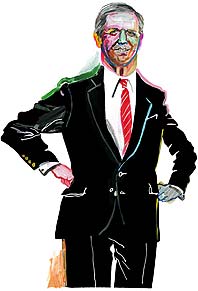
When Diane Sawyer did not get tapped to anchor ABC’s World News Tonight, it could have been reasonably assumed that she must not have wanted the job. Otherwise, what could explain the decision? She is the network’s most bankable news star, and she has made no secret of her desire to handle weightier fare than she can get away with on Good Morning America. In fact, her original decision to sign on as co-host of the ailing GMA was motivated in part by a desire to do what was best for the network, with the clear indication that she’d move on to other things when the salvage operation was done. For bringing GMA into hot contention with NBC’s previously dominant Today show, surely she had earned first dibs on the network’s most prestigious news job. But did she want it?
“Yes and no,” she told me as we sat in her office on West 66th Street. “No and yes.” There were, apparently, other considerations.
The 60-year-old Sawyer has a reputation for sharp career instincts. But in this instance, another side of her has come into view. Faced with a choice that would shape the rest of her broadcast career, she slipped into Hamlet mode, unsure of how to balance her loyalties and self-interest. Which, as much as anything, is what gave her GMA co-host, Charles Gibson, the chance to land the job himself—and to ensure that it was his and his alone. Gibson had none of Sawyer’s ambivalence. He saw his opportunity and he took it, pushing aside both Sawyer and Elizabeth Vargas, the pregnant incumbent who is going on maternity leave in August and fully expected to return. Now Vargas seems to be out of a job, and Sawyer is stuck on GMA, unhappily, with no obvious next move for her. Rather than solve the significant, perhaps terminal long-term problems of the evening news, Gibson’s ascension may well have exposed a whole raft of new ones for ABC.
Before Peter Jennings, the sturdy and magnanimous icon of ABC’s World News Tonight, announced he had lung cancer in the spring of 2005, ABC News executives were content to act as if his tenure would extend indefinitely into the future. “I think we all dreamed that Peter would be there forever,” says Sawyer. This wasn’t wishful thinking or pure delusion. It was the ABC plan. While Tom Brokaw and Dan Rather retired, Jennings would stay for two, three years, perhaps longer, and give ABC not only a competitive advantage in the meantime but the chance to groom his successors. Neither Sawyer nor Gibson figured in the equation. By the time Jennings was ready to go, the morning-show hosts would no longer be viable candidates to replace him, clearing the path for the next generation.
Confronted with Jennings’s sudden demise, ABC News president David Westin first tried a stopgap measure. He offered a two-year deal to Gibson to keep the seat warm until the 2008 election and then gracefully move aside. Westin says he considered offering the job at that time to Sawyer. “Given her stature and her history and her talents, anyone would have considered that,” he says. “That would be a bold and powerful move.” Rumors leaked out that, in fact, Sawyer wanted the job and had made a play for it.
But at the time, both ABC and Sawyer had a strong mutual interest in not upsetting the balance at GMA. The hugely profitable program, which contributes much more to ABC’s bottom line than the evening news, was gaining fast on the Today show. Losing Sawyer would sap that momentum, destroying years of progress. And so the interim spot was offered to Gibson, who promptly rejected it. Unlike Sawyer, Gibson, at that point in his career, was no longer willing to take one for the team. He made clear he would accept nothing less than the permanent position.
With nowhere else to go, Westin turned to the network’s younger stars, Vargas and Bob Woodruff, and anointed them co-anchors. This move was heavily influenced by one of Westin’s lieutenants, Paul Slavin, who saw the two new anchors as agents of a youthful resurgence at ABC News. They took over on January 3, and though their ratings lagged well behind Brian Williams’s at NBC, the situation seemed relatively sustainable.
All that came undone on January 29 of this year when Woodruff was nearly killed in a roadside attack in Iraq. That was a Sunday, and the next day, Vargas told Westin that she was pregnant. Westin, a lawyer who worked his way up ABC’s corporate ladder, had been dealt perhaps as difficult a hand as any TV-news executive ever had. He had to proceed cautiously and allow, first, for the possibility of Woodruff’s rapid recovery. Over the subsequent days and weeks, he conferred regularly with Woodruff’s family. In that time, it became clear that it would be a long while until Woodruff was ready to return to the air, if ever (in recent weeks, he has had a piece of prosthetic skull put in his head, and people who have spoken with him say his memory and speech are still shaky). Inside ABC, it is understood that Woodruff’s family applied pressure on Westin to keep him from giving away Woodruff’s job (the family declined to comment for this story), but Westin disputes that categorically. “I’ve had no resistance from them at all,” he says. “I’ve told him every time I’ve seen him, ‘There’s a chair here.’ I’m not sending a message that ‘you can’t come back and there won’t be room for you.’ ” But whatever hopes Woodruff and his family may be harboring, that chair was not going to be the anchor chair.
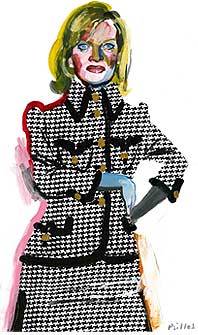
For most of the winter and then the spring, Westin was right back where he’d started, contemplating how much damage he could afford to do to GMA in the cause of saving World News Tonight from a ratings sinkhole. Two days after Woodruff’s injury, Westin asked both Gibson and Sawyer to substitute for Woodruff on World News Tonight, effectively setting up the horse race. He also asked them, as well as Vargas, to talk to him separately about their ideas for reformatting World News Tonight. This would be the beginning of a long and agonizing series of discussions.
From the outset, Charlie Gibson’s position was clear and unwavering. A 63-year-old TV veteran, Gibson is cut from the Father Knows Best mold. Although he’d spent much of his career in the morning trenches, hosting Good Morning America on and off since 1987, he was one of the big boys of TV news, with enough gravitas to moderate a presidential debate in 2004. But he still hadn’t grabbed the brass ring of network TV: the evening anchor, the face of ABC News. Gibson felt he was owed the chair, and much of the newsroom agreed, seeing him as an old-school anchor who would respectfully follow in Jennings’s footsteps. For that very reason, Westin angered many staffers when he only half-offered the job to Gibson last December. Gibson turned it down because it would have meant departing before coverage of the 2008 election, which he wanted to anchor. (There are some in the newsroom who think Gibson’s pride caused a lot of unnecessary anguish for ABC—they suggest that as a matter of strategy, Gibson should have taken the two-year deal then, because it would’ve been hard to dislodge him once he had the job.)
Having felt burned once, Gibson wasn’t going to let it happen again. People close to him say he was tired of GMA—and especially tired of pulling double duty in the evening, subbing for Woodruff. The genial on-air presence was getting less genial by the second: Not only was he asking for more money and a longer contract this time, but he told Westin he’d quit if he didn’t get the job—and he wanted it alone, without Vargas.
In threatening to walk, Gibson had serious leverage—because the threat was so genuine. His wife, Arlene, had just retired as head of the Spence School, making the prospect of his own retirement even more attractive. “I think he was genuinely happy to retire,” says one ABC News producer. “You can only play that card if you mean it.”
Westin was again in a tough spot. Not only did he have Gibson eyeing the door, but he had repeatedly told Vargas she would still be a co-anchor of World News Tonight after her maternity leave, and she was expecting that promise to be kept. But more important, he had yet to fully discern the desires of ABC News’ resident sphinx, Diane Sawyer—in large part because she herself couldn’t make up her mind.
In an interview, Gibson recalled that he and Sawyer had taken on Good Morning America seven years ago as an experiment, checking in with each other regularly to see if the other remained interested in the show. “Diane and I came in to this show, on a temporary basis,” he says. “We always said it was finite, and she’s had discussions with David. She’s had discussions for seven years. We said we’d hang in together. I went to Diane and said, ‘Are you okay with this?’ She said to me, ‘Sure.’ Indeed, she said, ‘You should go do it.’ That was enormously important to me.”
Did Gibson assume her assent was genuine and that she was happy at GMA? “I think she’s in it for a while,” he says. “It’s an interesting program to do.”
But privately, Sawyer is also tired of doing the show. Getting up at 4 A.M. every day to do cooking segments and soft-focus interviews has taken its toll. Like Gibson, Sawyer also wants something more substantial and befitting her age. But she wasn’t yet prepared to quit over it like Gibson was, and that put her at a significant disadvantage.
Sawyer’s refusal to play such a card put her career into a kind of paralysis. Gibson’s ascension would leave nothing of consequence for her at ABC News—or in network news, for that matter—when she eventually departed GMA. If she didn’t move up to World News Tonight, what else was there? ABC’s long-running newsmagazine PrimeTime, where Sawyer began her career at ABC in 1989, isn’t even on the regular fall schedule this year.
Most glaring, former morning-show queen Katie Couric had just moved from Today to the CBS Evening News, single-handedly shifting the TV-news heat to 6:30 P.M. Couric had hired Harvey Weinstein’s former PR man Matthew Hiltzik to help push the perception that the evening news was the place to be—consequently defining the morning host as a lower life-form stuck in the tar pits of reality-TV cheerleading, sucking up to celebrities, and pretending to enjoy eating freshly cooked pasta dishes at 7:30 A.M.
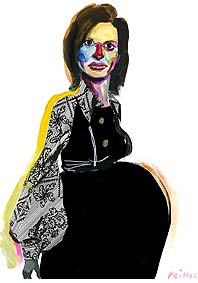
As the discussions grew more intense, Westin made sure to stay attuned to the desires of Sawyer, a kind of occult influence at ABC News and a woman with whom he has had a complex relationship. Sawyer was an acolyte of the late Roone Arledge, the legendary ABC News president who invented Nightline and 20/20, and who nurtured superstar anchors like Jennings and Ted Koppel. Because he had created them, and because he was such a larger-than-life figure, Arledge was always able to maintain strong control over his on-air talent. As famous as they became, Jennings and Koppel served at Arledge’s pleasure.
Westin, on the other hand, didn’t create stars, he inherited them—and the stars didn’t necessarily listen to him. Westin’s abilities tended more toward lawyerly mediation and political calculation than gut instincts about television. As a $12 million–a–year star, Sawyer has essentially shared power with Westin since he arrived in 1997, in part because she helped smooth the way for his hire. At the time, Westin was engaged in a widely publicized affair with Sherrie Rollins, the then-wife of GOP strategist Ed Rollins, upsetting Disney executives who were displeased with the indiscretion. Sawyer was friends with Sherrie, who is now Westin’s wife, and threw a wedding party for the two at her house in Martha’s Vineyard. Sawyer and her husband, film director Mike Nichols, introduced David Westin to their celebrity social spheres, deepening the relationship. When Sherrie Westin was pregnant with the couple’s first child, Sawyer attended an ultrasound.
When Sawyer agreed to take the job co-hosting GMA, she gave Westin his first taste of ratings success at ABC News. It also validated Sawyer’s superstar status and may well be the greatest achievement of her career. “I’m very attached to the show, and I have been able to do things with the show and on the show that have given me a real sense of freedom and surprise,” Sawyer says. “That doesn’t always happen when you’ve been around this long.”
Both Sawyer and Westin acknowledge that she would love to anchor World News Tonight, but Westin says Sawyer was clear—she didn’t want it if it meant taking it away from Gibson. “She wasn’t being coy,” says Westin. “She really did mean it.”
If Sawyer did get the job over Gibson—and Gibson made good on his promise to bolt—that would leave a smoking crater where Good Morning America once was, a major blow to ABC News. A GMA stripped of both stars was a risk that Westin could not take; Sawyer almost certainly would have known that and realized that if she had demanded the anchor job, he may not have been in the position to give it to her. Instead he had to set up a situation in which she decided not to pursue the job. Which is more or less how she tells it. “Everyone always says the morning drives the news these days, but you can’t come out of hard news and be in this business and not be interested in World News Tonight,” says Sawyer. “But for me, not if it costs this network Charlie Gibson. Period.”
Did she resent Gibson for his hard position?
“It’s his life, and he has to love his work, too,” she says.
Through the course of many conversations between Sawyer and Westin, Westin says that he gave Sawyer the chance to take the job, but she wouldn’t. This is his official position, and it squares with Sawyer’s official position, which is that she had these other concerns and wasn’t sure she wanted it. Except of course that she did want it. The situation thus started to move toward a predictable outcome—that she wasn’t going to get it, and that Gibson was.
Instead of being content with this state of affairs, Sawyer seemed very much at loose ends. Clearly, she had been outplayed. Should she have fought for the job? Was there still a chance? When she left for a sailing vacation in the Caribbean in April, some ABC News executives got the distinct impression from Westin that Sawyer was so unhappy that she might quit, say people familiar with the situation.
During the trip, which included Vanity Fair editor-in-chief Graydon Carter, screenwriter Nora Ephron, and media mogul David Geffen, Sawyer asked Geffen for career advice. He recommended she dial up Allen Grubman, a high-powered entertainment lawyer who also represents Barbara Walters, to explore her options. When she got back, Sawyer hired Grubman and began having conversations with Disney chief Robert Iger and Anne Sweeney, the co-chair of Disney Media Network and president of the Disney-ABC Television Group.
She acknowledges that she was concerned about her future at that point but says she hired Grubman only to examine her contract, not to play hardball with ABC News or Disney. Since a falling-out with her former agent, Richard Liebner, Sawyer says she simply hasn’t had a business adviser. “To proceed down the near- and medium-term without anybody who was going to help with any of this stuff just didn’t seem smart,” says Sawyer. “Everybody around me said, ‘You’re insane, what are you doing?’ It was to think about medium- and long-term—looking ahead.”
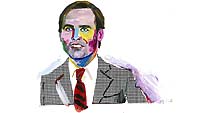
But given her age, Sawyer’s next job is likely her last, and she knows it. What exactly Grubman did—whether he negotiated an exit strategy from GMA or fought for the anchor position—isn’t entirely clear. Sawyer declined to discuss it, other than to say that one of her desires is to do more serious journalism in prime time. “If I can’t do that kind of thing, I’m vitamin-deficient,” says Sawyer. “I can’t do this work if I can’t also get some big, meaty stuff to do.”
Sawyer was also worried about the prospect of being left on a destabilized show. GMA is almost a million viewers behind the Today show after a neck-and-neck ratings run last year. And she now faced the prospect of losing to a newcomer, Meredith Vieira, former co-host of the ABC chat show The View, who was replacing Couric on Today. When it was first reported in April that Vieira was being courted by NBC, Sawyer became concerned. In a rare moment of mutual interest, Sawyer joined forces with Barbara Walters, the former ABC News grande dame and a View co-host, to talk to Westin about Vieira’s future at the network. Over the years, the relationship between the aging Arledge-era superstars had been cool at best, downright venomous at worst. For Sawyer, the motive was clear: She didn’t want Vieira as competition, especially since GMA would already be weakened by Gibson’s imminent departure. Getting beat by Couric was one thing, Vieira quite another. As it happens, hiring Vieira at ABC News would also offer another scenario: Vieira could replace Sawyer on Good Morning America, allowing Sawyer to take the evening program or move on.
But the pitch made for Vieira didn’t appear very competitive. “Barbara Walters at one point did raise the possibility of making an arrangement to do some pieces for 20/20 to encourage her to stay,” says Westin. “We did talk very seriously about having Meredith play some role on the newsmagazines. But Meredith on GMA didn’t get much past the starting gate.”
With newsroom staffers growing anxious for resolution, ABC News had hoped to end the four months of uncertainty by announcing a new anchor at the upfronts in May, the yearly event where networks unveil their fall shows for advertisers. The week before, Westin had come to his decision and formally offered Gibson the job—co-anchoring the evening news with Vargas.
Gibson steadfastly refused, telling Westin he would retire at the end of his contract next year. To drive his point home, he also refused to substitute for Vargas during her maternity leave, says a person familiar with the situation. “In talking to Charlie, it became clear the way Charlie perceived this program and his role on the program … It was really more of a one-anchor program,” says Westin.
On the day of ABC’s upfronts presentation, the previous week’s ratings showed World News Tonight had slipped to third place in the ratings behind CBS News for the first time in five years, ratcheting up the tension at ABC. Although the network insists the discrepancy of nearly 80,000 viewers was an anomaly, World News Tonight was undeniably sinking. And there was fear about what would happen when Couric took over in September for Bob Schieffer at CBS.
After haggling with Gibson, Westin finally made a decision. Days before the announcement, he told Vargas that Gibson would take over World News Tonight, alone.
Vargas, 43 years old, began her career at ABC as a news reader for GMA, where producers had hoped to groom her as an anchor. But Gibson didn’t cotton to her and was “far from warm and welcoming,” says a person familiar with the situation. She eventually sought a role at the newsmagazines. She wound up as a co-anchor of 20/20 and early on voiced a desire to one day anchor World News Tonight, saying she felt a woman other than Sawyer should be considered for such jobs. Asked at the time if she’d been contacted about the CBS Evening News position, which Couric was already rumored to be up for, she said, “I think they’re too busy calling Diane Sawyer.”
When Westin gave her the news, Vargas was taken by complete surprise, say people close to her. Having been assured by Westin that she would retain her job when she returned, they say, she felt betrayed.
Westin has a different memory of Vargas’s reaction. “Surprised?” he says. “No, I’m not sure it is right. She had raised with me her concerns about her health and family. We made a mutual decision. I don’t think so, but you need to ask her.”
Asked to comment, Vargas describes her reaction as “complicated,” but says her pregnancy had caused her to reevaluate her life and career. “I hope I get another chance to do this job, maybe at another time,” she adds. “It doesn’t mean it might not work out in a few years.”
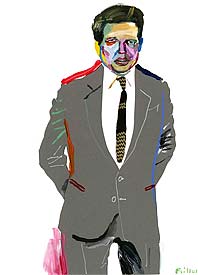
The drawn-out process hurt morale at ABC News, with many staffers critical of Westin’s indecision. “It is regretful that the decisions didn’t come sooner,” says a news staffer who professes to like Westin. “We’re living it every day, and every day a decision wasn’t made, it affected everything, the way things are structured.”
Westin is sanguine about the criticism. “Nobody likes uncertainty,” he says. “But I’ve learned the hard way that you can get rushed to a decision and it can happen prematurely and it causes more damage than if you’d waited.”
In the end, it simply made little sense for Westin to give the job to Sawyer. She holds up the most lucrative program in the news division, and she has several more years on her contract. Gibson had only one year left—and a light, three-day-a-week schedule for the last year—and was fully prepared to leave. Westin knew Sawyer’s contract provided for at least six more months of work on GMA, keeping the program competitive against Vieira, and buying him time to dream up a replacement and then another show for Sawyer. In Gibson, Westin gets his own Bob Schieffer—a trusted figure whom the older demographic that still watches the evening news can relate to. The youth moment will just have to wait; and Vargas, well, sadly she is collateral damage that Westin can afford.
Not incidentally, denying Sawyer the job subtly changed Westin’s status inside the network—for the first time, it would appear, Westin said no, or something like no, to Sawyer. And that makes him look like his own man.
In the catty backrooms of broadcast news, the perception of having lost is as bad as actually losing. Case in point: Earlier this month, the Washington Post filed Sawyer in the “losers” slot in its TV column, asking, “What’s left for Di?” Even Sawyer’s allies concede she got nothing out of the deal. “She got Allen Grubman, that’s what she got,” says one friend.
But does Diane Sawyer think Diane Sawyer lost? “No,” she says. “They were complicated choices. But I know I made the right one for me. And I truly think this is all best for the network too.”
If she has given up on the idea of the anchor chair, she has taken this opportunity to explore her options. A few ideas have been floated by ABC News, including the chance to run PJ Productions, the documentary unit founded by Peter Jennings.
Meanwhile, there’s GMA, on the ropes again. The show’s executive producer, Ben Sherwood, resigned earlier this month, and there is neither a male anchor nor a weatherman. Sawyer has agreed to stay on GMA through 2007, prompting speculation that she may depart soon after. Asked if Sawyer will be at GMA this time next year, Westin hedges his bets: “Do I expect Diane to retire off of GMA at ABC News?” he asks. “No. At some point, we’ll decide it’s time for her to do something else after GMA.”
For now, Sawyer says she’s dedicated to first reviving GMA with her co-anchor, Robin Roberts. “I want to make sure GMA is great,” she says. “Robin and I together.”
Asked what her own future holds beyond that, Sawyer laughs. “I’m taking all suggestions,” she says.